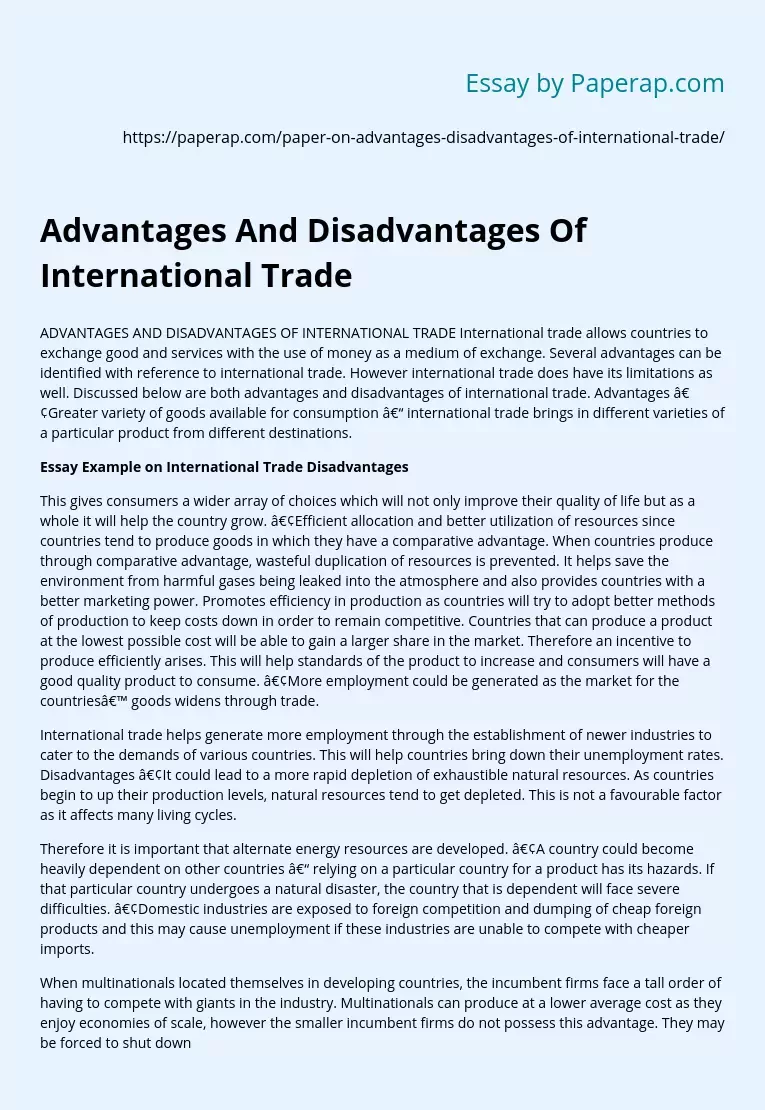Advantages And Disadvantages Of International Trade
ADVANTAGES AND DISADVANTAGES OF INTERNATIONAL TRADE International trade allows countries to exchange good and services with the use of money as a medium of exchange. Several advantages can be identified with reference to international trade. However international trade does have its limitations as well. Discussed below are both advantages and disadvantages of international trade. Advantages •Greater variety of goods available for consumption – international trade brings in different varieties of a particular product from different destinations.
Essay Example on International Trade Disadvantages
This gives consumers a wider array of choices which will not only improve their quality of life but as a whole it will help the country grow.
•Efficient allocation and better utilization of resources since countries tend to produce goods in which they have a comparative advantage. When countries produce through comparative advantage, wasteful duplication of resources is prevented. It helps save the environment from harmful gases being leaked into the atmosphere and also provides countries with a better marketing power.
Promotes efficiency in production as countries will try to adopt better methods of production to keep costs down in order to remain competitive. Countries that can produce a product at the lowest possible cost will be able to gain a larger share in the market. Therefore an incentive to produce efficiently arises. This will help standards of the product to increase and consumers will have a good quality product to consume. •More employment could be generated as the market for the countries’ goods widens through trade.
International trade helps generate more employment through the establishment of newer industries to cater to the demands of various countries.
This will help countries bring down their unemployment rates. Disadvantages •It could lead to a more rapid depletion of exhaustible natural resources. As countries begin to up their production levels, natural resources tend to get depleted. This is not a favourable factor as it affects many living cycles.
Therefore it is important that alternate energy resources are developed. •A country could become heavily dependent on other countries – relying on a particular country for a product has its hazards. If that particular country undergoes a natural disaster, the country that is dependent will face severe difficulties. •Domestic industries are exposed to foreign competition and dumping of cheap foreign products and this may cause unemployment if these industries are unable to compete with cheaper imports.
When multinationals located themselves in developing countries, the incumbent firms face a tall order of having to compete with giants in the industry. Multinationals can produce at a lower average cost as they enjoy economies of scale, however the smaller incumbent firms do not possess this advantage. They may be forced to shut down leading to a loss of jobs. •APIIT Sri Lanka, Business School, Business Economics, Subject Notes •http://en. wikipedia. org/wiki/International_trade
Advantages And Disadvantages Of International Trade. (2019, Nov 27). Retrieved from https://paperap.com/paper-on-advantages-disadvantages-of-international-trade/

